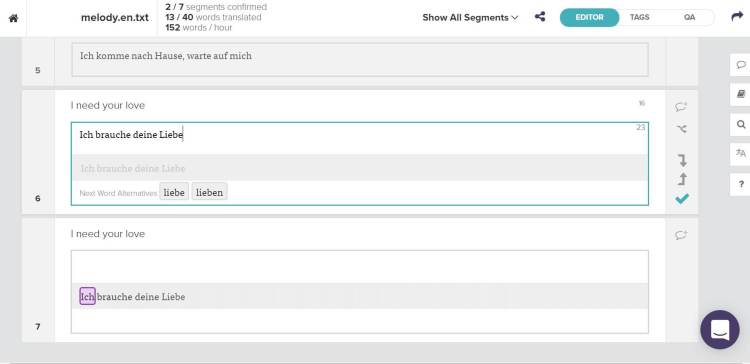Lilt, a startup that has developed a web application and application programming interface (API) for helping translators work more quickly, is announcing that it’s raised a $2.35 million seed round.
Lilt uses statistical machine translation to offer potential translations of sentences in different languages, then changes the rest of sentences on the fly as human translators type their translations into text boxes. With every human input, the machine translation system grows smarter, such that future automated translations take into consideration its previous lessons learned. And learnings flow from one document to another. Plus, the software can properly handle formatting quirks in documents like Microsoft Word files during the course of translation.
The tool isn’t designed for end users; it’s meant for people who know two languages, such as translators. This might not seem like a very big population for a startup to target, but translation is something companies pay for, and certainly some companies will be willing to pay to help their translators get the job done faster.
Lilt is announcing its funding shortly after Google announced the launch of a neural machine translation system to power translations from Chinese to English in Google Translate. Tests suggest that these translations are higher-quality than Google’s earlier phrase-based system.
But training on graphics processing units (GPUs) to teach a neural machine translation system is expensive. Over time Lilt wants to move to that model to improve its automated translations, Lilt cofounder and CEO Spence Green told VentureBeat in an interview. Currently Lilt relies on the Stanford University Natural Language Processing (NLP) Group’s open source Phrasal library.
Lilt was founded in 2015 and is based in Palo Alto, California, with seven employees. Redpoint Ventures and Zetta Venture Partners led the round, and XSeed Capital also contributed. To date the startup has raised $3 million. Green wouldn’t talk about how many customers Lilt has, but did say it has more than 10.
Competitors include SDL and the Microsoft Translator Hub.
VentureBeat's mission is to be a digital town square for technical decision-makers to gain knowledge about transformative enterprise technology and transact. Learn More

